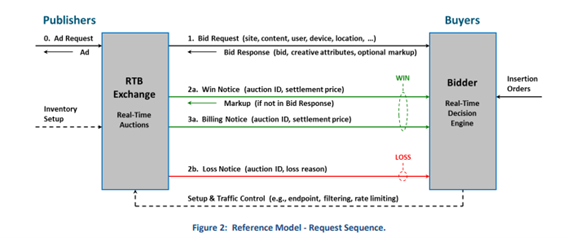

Programmatic revolutionized the way the industry buys and sells advertising inventory. RTB (Real Time Bidding) technology allows buying and selling ad impressions in real time. In this article we will focus on the communication protocol that operates between all RTB systems (the OpenRTB protocol), and its evolution up to the current Open RTB 2.6.
Open RTB (Real Time Bidding) is an automated information exchange protocol between advertising inventory buyers and sellers. The project was born in 2010 with the idea of unifying, simplifying and giving confidence to all the parties involved in the programmatic ecosystem.
The standardization of information, allows the unification of the necessary criteria that let buyers decide on the offer they will make (are they interested in bidding for this specific impression? If yes, how much will they bid for?) and publishers to accept that offer and deliver that impression (is this spot the best choice for my advertising strategy?).
OpenRTB is the protocol that allows the aforementioned process to occur in a transparent and reliable manner for stakeholders involved in this process. In RTB there are mainly 2 different sides that need to communicate each other: DSPs and SSPs. Advertisers place their bids from demand side platforms (DSPs) and publishers make their inventory available to buyers on supply side platforms (SSPs).
Both DSPs and SSPs follow the OpenRTB protocol for all communication in the auction process. The process is as follows:

For a complete overview of the configurable parameters for this type of call, please refer to the complete version specification Open RTB 2.6.
It is also very important to emphasize the important changes and evolutions that have been taking place in the different versions of Open RTB, from version 2.0 of 2012 to version 2.6. For instance, 2.3 version, added native ads support. Given the current high demand in the CTV advertising market, Open RTB has had to develop tools to provide the players involved in the advertising buying and selling to help them make a better decision in RTB transactions. OpenRTB 2.6 brings new features interesting for CTV stakeholders in particular.
The first innovation is that, from now, it is possible to advertisers to bid for a specific ad space within an ad pod. Publishers and broadcasters also have the capability to set a minimum CPM depending on that position, giving greater importance to the place of the spot within the ad break, as it was already the case in traditional TV ad breaks.
It also brigns the capability to create different types of pods, being these flexible, i.e. it is not any more mandatory to structure a 90 second pod strictly with 3 ads of 30 seconds duration (structured pod), now it’s possible to include in that advertising break a number of ads and desired duration within the total duration of the break (dynamic pod) or even establish a flexible pod, which has a fixed duration within the same pod and another flexible one, for example a 90 second pod, will have 60 seconds flexible and a fixed ad of 30 seconds (hybrid pod). This fact has introduced the capability bid per second. On their side, content providers have started to use a new metric RPS (revenue per second), so they can better optimize their inventory.
Another important innovation, is that Open RTB 2.6 adds a new field to further detail the taxonomy used in bid requests / bid responses, for which it is established that this field carries information about the taxonomy used, and that it will be:
Here You can consult the categories by taxonomy, some of them having more than 1000 different values.
In the near future, the Industry will adopt the Open RTB 3.0 protocol (ready since 2018), but it is still necessary the complete adoption of 2.6 that will be in charge of preparing on a tech perspective all the companies in the Industry.
There is no doubt that the cornerstone of the advertising growth with RTB technology is the Open RTB protocol, which will continue to adapt according to the needs of the different stakeholders in the industry.
At tvads we has a professional team able to advise you on this field and and guide you in any area of your streaming advertising business, advising you or even operating it on your behalf if necessary
All author posts